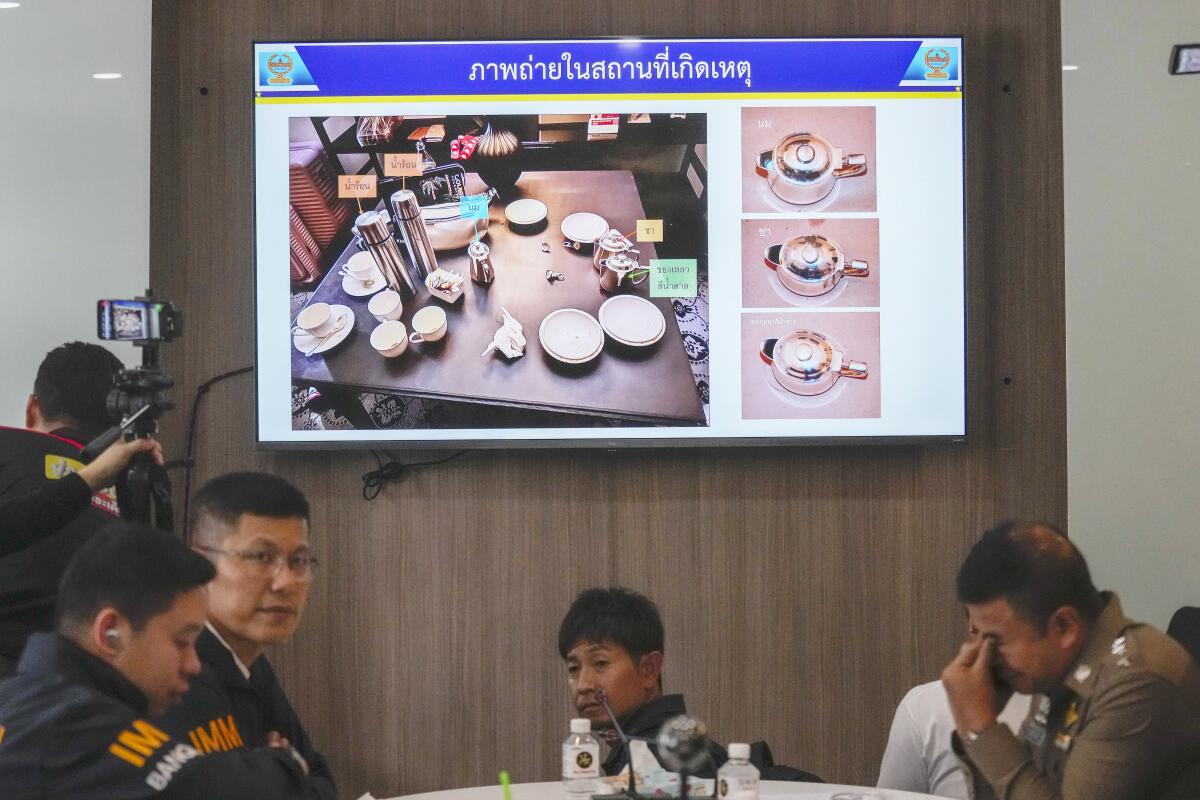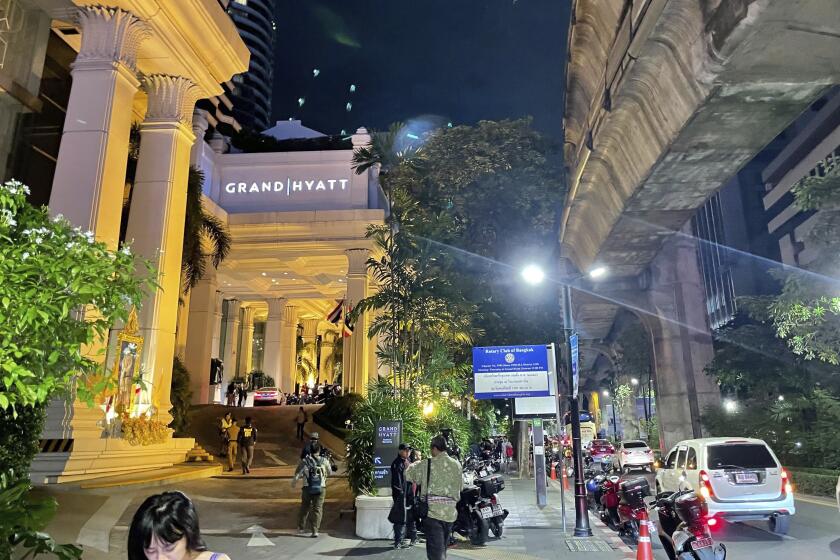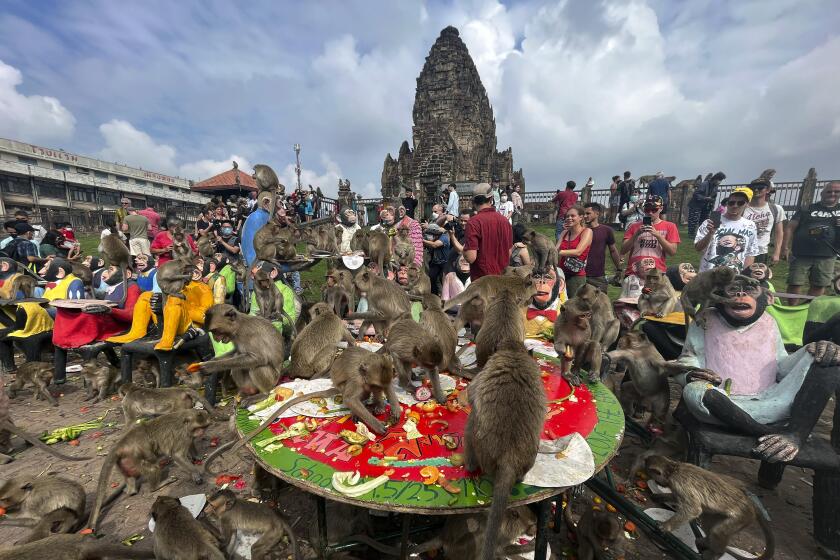Autopsy reveals cyanide in blood of Americans and Vietnamese found dead in Bangkok hotel

- Share via
BANGKOK — Initial autopsy results showed traces of cyanide in the blood of six Vietnamese and American guests at a luxury hotel in central Bangkok, and one of them is believed to have poisoned the others over a bad investment, Thai authorities said Wednesday.
The bodies of the six were found Tuesday in the Grand Hyatt Erawan Bangkok, a landmark at a central intersection in the capital busy with malls, government buildings and public transit.
The six had last been seen alive when food was delivered to the room Monday afternoon. The staff saw one woman receive the food, and security video showed the rest arriving one by one shortly after. There were no other visitors, no one was seen leaving and the door was locked from the inside. A maid found them Tuesday afternoon when they failed to check out of the room.
Upon entering the room, hotel staff found that food ordered from the previous day was left untouched, with some servings of fried rice still under plastic wrap. Though the food was untouched, several used teacups were on a nearby table, next to two thermos bottles.
Police in Thailand say poisoning is suspected in the deaths of two Vietnamese Americans and four Vietnamese nationals at a luxury hotel in Bangkok.
Lt. Gen. Trairong Piwpan, chief of the Thai police force’s forensic division, said there were traces of cyanide in the cups and bottles.
Initial results from autopsies of the six bodies, performed at Bangkok’s Chulalongkorn Hospital, were shared later Wednesday. Kornkiat Vongpaisarnsin, head of the forensic medicine department at Chulalongkorn University’s medical school, said at a news conference that there was cyanide in the blood of all six, and that there were no signs of blunt-force trauma, reinforcing the hypothesis that they had been poisoned.
Chulalongkorn’s dean of medicine, Chanchai Sittipunt, said the team knew enough from the cyanide to determine it was likely the cause of death.
Bangkok’s police chief, Lt. Gen. Thiti Sangsawang, identified the dead as two Vietnamese Americans and four Vietnamese nationals, and said they were three men and three women. Their ages ranged from 37 to 56, according to Noppasin Punsawat, the deputy police chief. He said the case appeared to be personal and would not affect the safety of tourists.
A husband and wife among the dead had invested about 10 million baht ($278,000) with two of the others, and that could be a motive, said Noppasin, citing information obtained from relatives. The investment was meant to build a hospital in Japan, and the group might have been meeting to settle the matter. Police say one killed the rest but did not say which of the six was the suspect.
Two years ago Thailand became the first country in Asia to decriminalize marijuana. As in California, it hasn’t worked out as planned.
Sangsawang said Tuesday that four bodies were in the living room and two in the bedroom. He said two of the people appeared to have tried to reach the door but collapsed before they could.
Noppasin said Wednesday that a seventh person whose name was part of the hotel booking was a sibling of one of the six and left Thailand on July 10. Police believe the seventh person had no involvement in the deaths.
The Vietnamese and U.S. embassies have been contacted over the deaths, and the FBI was en route, Prime Minister Srettha Thavisin said. “This wasn’t an act of terrorism or a breach in security. Everything is fine,” he said.
Trairong said a mass suicide was unlikely because some in the group had arranged future parts of their trip, such as guides and drivers. He said the bodies being in different parts of the hotel room suggested they did not knowingly consume poison and wait for their deaths together.
Thai wildlife officials have a plan to bring peace to a central Thai city after at least a decade of human-monkey conflict.
U.S. State Department spokesperson Matthew Miller in Washington offered condolences to the families of the dead. He said the U.S. is closely monitoring the situation and would communicate with local authorities. Secretary of State Antony J. Blinken spoke with his Thai counterpart on Tuesday, but Miller said he thought that call happened before the deaths were reported and he didn’t know if the incident came up in their conversation.
The five-star Grand Hyatt Erawan is one of Bangkok’s landmark hotels. The Erawan Shrine that sits on the corner of its block has been a major tourist attraction since it was erected on the advice of astrologers during the hotel’s construction in 1956 to ward off bad luck.
Visitors worship at the shrine, requesting divine intervention on issues from relationship troubles to exam preparation. The shrine was the target of a 2015 bombing that killed 20 people and injured more than 100.
In 2023, Thailand was rocked by reports of a serial killer who poisoned 15 people with cyanide over a span of years. Sararat Rangsiwuthaporn, or “Am Cyanide” as she would later be called, killed at least 14 people to whom she owed money. One person survived.
Saksornchai and Kongsawad write for the Associated Press.
More to Read
Sign up for Essential California
The most important California stories and recommendations in your inbox every morning.
You may occasionally receive promotional content from the Los Angeles Times.













